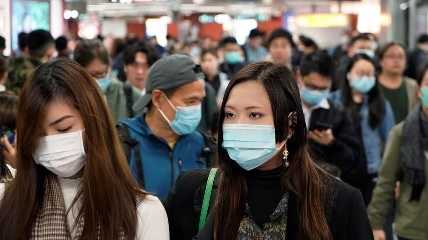
BEIJING (AP) — Officials in Shanghai promised Friday to ease anti-virus controls on truck drivers that are hampering food supplies and trade, while city streets were still largely empty after millions of people were allowed out of their homes.
A deputy mayor, Zhang Wei, promised “every effort” to resolve problems that prompted complaints about lack of food and fears that the shutdown, which barred most of Shanghai’s 25 million people from going outdoors, might disrupt global trade.
The streets of China’s most populous city were quiet despite an easing of restrictions beginning April 13 that has released more than 10 million people. Many were barred from leaving their neighborhoods. Others had nowhere to go because most factories, shops and offices were closed.
In one neighborhood, a woman rode a skateboard and a couple took a child’s photo outside a park. Delivery drivers rode past on scooters while government employees in white suits sprayed disinfectant on trash bags.
“You can only walk the dog,” said resident Isabella Kao, who cannot leave her apartment compound because nearby areas are quarantined. “There’s no point in going out because all your stores are closed, right?”
On Friday, the government reported 11 coronavirus deaths and 17,529 new cases in Shanghai. All but 1,931 had no symptoms. Shanghai accounted for 95% of the 18,598 new cases on China’s mainland, of which 2,133 had symptoms.
Shanghai leaders are scrambling to ease the impact of a “zero-COVID” strategy that shut down most businesses starting March 28.
China’s infection numbers in its biggest outbreak since the start of the pandemic in 2020 are low compared with other major countries. But the ruling Communist Party has suspended access to Shanghai and some other major cities to isolate every case, fueling public frustration and warnings about the rising cost.
Truck drivers who bring food to Shanghai and goods to its port, the world’s busiest, are hampered by multiple checkpoints and virus tests. That has led to long waits and reports some shipping companies and drivers are avoiding Shanghai.
Under the new system, drivers are allowed through if they have a negative virus test within the past 48 hours, no fever and a “green health code” on their smartphone that shows they haven’t been to areas with outbreaks, according to Wu Chungeng, director of the Highway Bureau of the Ministry of Transportation.
“All localities should directly release them,” Wu said, according to news reports.
Meanwhile, some 80,000 small enterprises in government-owned buildings in Shanghai will be given six months’ free rent, the director of the city’s commission for state-owned assets, Bai Tinghui, said at the news conference with Zhang, according to state media.
The government has made 65 billion yuan ($10 billion) in “support loans” to Shanghai businesses and distributed other financial aid, the online news outlet The Paper reported, citing city officials.
Officials said the Shanghai port is operating normally, according to news reports. But daily cargo volume they cited of the equivalent of 100,000 containers is down almost 30% from the normal level of 140,000 containers.
Authorities are enforcing a three-tier system that allows residents out of their homes if their area has no new infections in the past week. They can leave the neighborhood after two weeks without a case. Supermarkets and pharmacies are reopening.
Some residents say they came close to being allowed out before a new case was found in a neighboring building and the wait started from scratch.
Kao, 38, who runs a trading company, said she and her partner have spent most of the six weeks since March 11 in their apartment. She said they were allowed to go to other parts of the city for only four days during that time.
Kao said her building is a “control area,” which means they are allowed outside, but around it is a “closed area” whose residents are confined to their homes.
“I feel the people of Shanghai are puzzled by the current anti-epidemic policy,” Kao said.




